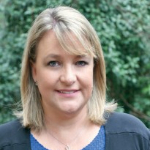In This Section

Kris Varley
Executive Vice President and Head of Factoring, Bibby Financial Services
Biography:
As head of factoring, Kris leads a team of 40 employees across sales and operations roles in Atlanta, Chicago and Los Angeles. Kris has proven her success executing regional growth strategies and expanded BFS’s U.S.-based factoring portfolio significantly over the past years. Since assuming the helm of BFS’ Factoring business, Kris’s international experience, ability to mentor colleagues and understanding of small business financing has helped restructure the factoring business, bringing it under one team to achieve synergies and high standards of customer service across the organization, thus strengthening BFS’s factoring services. Kris quickly rose through the company ranks after joining Bibby Financial Services North America (BFS) in 2005 and was promoted to executive vice president four years later, overseeing eight potential acquisitions and supporting the opening of new offices. Kris then spearheaded global change management programs at BFS and helped create the foundation for today’s North America operations.
What advice would you offer to women just starting out in the industry?
Gender has far fewer barriers for career progression than in previous decades. It seems unbelievable that the lender I started with 25 years ago would not allow women to wear pants to work and there were no female business development officers, senior managers or executives in the company, especially when compared to today, where women are found in a variety of roles in businesses. To young people in general getting started in our industry, I would suggest they be prepared to learn, listen and take advantage of opportunities. Also, never underestimate continued learning opportunities through conferences, workshops, etc. keep your skills fresh and stay current on the industry and news impacting it.
What do you know now that you wish you knew in the beginning of your career?
That hard work brings success and people stay in this industry a long time. Many of the people I worked with at the beginning of my career are still in the industry. The group of experts and peers you connect yourself to can become an invaluable support network. Even in a country as large as the USA, the industry is pretty small and everyone knows everyone, which was pretty surprising, coming from the UK 13 years ago.
What kind of role has mentoring and/or sponsorship played in your career?
When I started my career, mentoring programs did not really exist, but I was fortunate to work with an extremely talented team of people. With so many true role models around me, it was easy to absorb their knowledge, to learn how to deal with different situations and what it takes to be great at your job. If your organization does not offer mentoring programs, my advice is to ask somebody that you work with that you see as a role model if they wouldn’t mind helping you to further develop. On the other side, know that mentorship also requires you to take the initiative and follow through for your development. Listen to everything going on around you and ask lots of questions to ensure you maximize learning opportunities.
What do you think the industry could do to attract and retain the best and the brightest today?
It’s at the company level where employers can do things that will attract and retain industry talent. Ongoing training and structured development programs to help track progress, together with open communication policies and allowing employees to voice their opinion are essential. We all need to move with the times and have to constantly implement new ways of doing business to stay relevant and take advantage of technological advances as they become available. People are more likely to stay if they feel empowered and have a say in how the businesses is run. Personally, I never set out to have a career in this industry. I came into it by accident after spending some time traveling and needing a way to pay my mortgage, but after a few weeks on a temporary placement, I was hooked. What has kept me engaged all these years is that no two days are ever the same and I have always felt I can make a difference in whatever role I’ve had. While experience matters to some degree, especially for senior-level roles, we do not look at how long somebody has worked for us in deciding whether they are ready for the next step. New people coming into our company are able to excel if they are willing to work hard, show initiative and learn from others around them with a positive attitude.
Professional Development Courses
- Live online classes for ABL and Factoring professionals
- On Demand classes in Appraisals, Factoring, Legal, Workout & Bankruptcy
